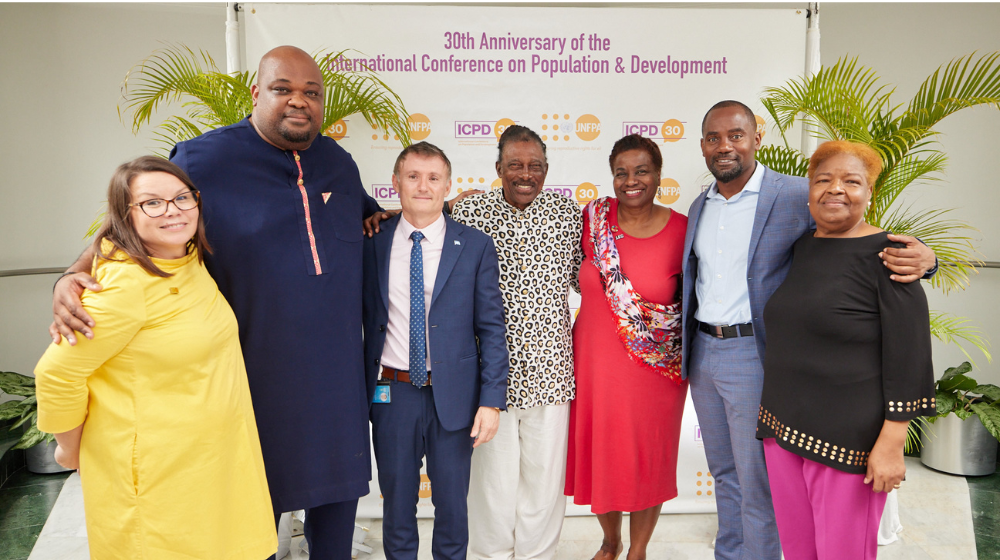Executive Director of United Nations Population Fund (UNFPA) Dr. Natalia Kanem has affirmed UNPFA’s commitment to continue advocacy and engagement with key partners to advance the ICPD agenda in the Caribbean. Dr. Kanem visited Barbados to deliver the keynote address at the Black Feminisms Forum that was held from February 4-7, 2024.
While there, the Executive Director engaged with several key stakeholders to reaffirm UNFPA’s commitment to continue supporting the Caribbean to champion the rights and choices of women and girls and foster continued collaboration and teamwork with the government, donors, partners, civil society organizations, private sector and other UN agencies.
One of the main events during her visit was a reception in commemoration of the 30th anniversary of the International Conference on Population and Development on Monday February 4. The event was attended by government officials, ambassadors and other esteemed guests including Honorable Kirk Humphrey, Minister of People Empowerment and Elder Affairs Senator the Hon. Chad Blackman, Minister of State, Ministry of Economic Affairs and Didier Trebucq, the United Nations Resident Coordinator for Barbados.
Minister Humphrey, who spoke on behalf of the government, assured of Barbados’ continued commitment to furthering the cause of the ICPD agenda, particularly as it relates to the empowerment and protection of women and girls. He also thanked UNFPA for the work being done in Barbados to support the government in this pursuit. “I want to take this opportunity to thank the United Nations and all the various agencies within the United Nations for the amazing work that they have done in Barbados in the Caribbean and in the world,” Minister Humphrey said.
Dr. Kanem in her remarks reaffirmed UNFPA’s commitment to continue supporting the Government of Barbados and other governments in the Caribbean. She mentioned work being conducted under the Sustainable Development Goals (SDG) Fund to help to strengthen the Barbados Government’s capacity to use population data for informed decision-making, noting the importance of data in fulfilling UNFPA’s mandate. She also highlighted a partnership with UN Women and Canada, the ‘Build Back Equal’ programme, which puts the empowerment of women and sexual and reproductive health and rights at the center of economic development in four countries in the Eastern Caribbean.
The following day, Dr. Kanem gave a keynote address at the Black Feminisms Forum where she noted that in the three decades since ICPD, UNFPA has worked with women and young people worldwide to deliver on the ICPD vision of a more just, prosperous, and peaceful world that fully upholds women’s rights and choices.
“Let’s imagine a world where equality and justice form the pillars of society where a 10-year-old girl, on the cusp of adolescence, navigates her neighborhood without fear,” Dr. Kanem said.
During her visit Dr Kenem engaged with Young People, Youth Advocates and Champions from Barbados and Barbados Cultural Ambassador, Dr. the Honourable Anthony “Gabby” Carter in an Intergenerational dialogue at the Barbados Library Service. It was an opportunity for dialogue with youth advocates and champions in Barbados to get their insights on the ICPD30 agenda. This activity was timely as UNFPA SROC sought to conduct consultations with youth in the Caribbean in preparation for the 4th SIDS conference (SIDS4).
The objective was to ensure that the perspectives from youth on ICPD@30 are integrated into the outcomes of the SIDS4 Conference.
About ICPD - ICPD stands for the International Conference on Population and Development, a 1994 meeting in Cairo where 179 governments adopted a revolutionary Programme of Action and called for women’s reproductive health and rights to take center stage in national and global development efforts. Specifically, the Programme of Action called for all people to have access to comprehensive reproductive health care, including voluntary family planning, safe pregnancy and childbirth services, and the prevention and treatment of sexually transmitted infections.


